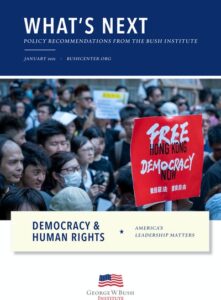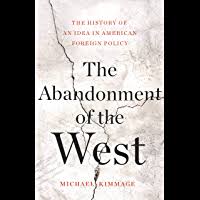 The riot at the Capitol on January 6 brought American democracy “to its knees,” said US Senator Chris Murphy (D-CT). But that shouldn’t prevent the United States from trying to both “self-correct domestically” and “do the work of democracy promotion,” he told an Atlantic Council event. “Doing that work abroad puts pressure on us to be a little bit more vigilant and to act a little bit faster on domestic democracy reform.”
The riot at the Capitol on January 6 brought American democracy “to its knees,” said US Senator Chris Murphy (D-CT). But that shouldn’t prevent the United States from trying to both “self-correct domestically” and “do the work of democracy promotion,” he told an Atlantic Council event. “Doing that work abroad puts pressure on us to be a little bit more vigilant and to act a little bit faster on domestic democracy reform.”
Autocrats are trying to make political capital out of recent events, but observers and democracy advocates suggest an alternative take – that crises demonstrate resilience as well as fragility.
“Counterintuitively, the real message of the 2020 election is that the U.S. remains strong,” says historian Walter Russell Mead. “Voters elected, electors voted, and the transfer of power proceeds apace. A perfect storm—a destructive pandemic, an economic maelstrom, a crisis in race relations, a bitter election campaign and, in the end, the effort of a defeated president to foment all the trouble he could—still couldn’t prevent the constitutional process from taking its course,” he writes for the Wall Street Journal.
Checks and balances
“The storming of the Capitol provides a lot of bullets for the pro-Beijing propaganda to stress that democracy is equal to chaos,” said Nathan Law, a former Hong Kong lawmaker and student protest leader who fled China’s crackdown on democracy activists last year. His own belief in democracy, he says, hasn’t wavered because America’s system of checks and balances is working, the WSJ adds.
 “These recent events have stunned everyone, and in particularly the Belarusians, who saw the U.S. as an example of a stable, orderly democracy where honest elections are followed by a lawful transfer of power,” said Franak Viacorka, a senior adviser to Mr. Lukashenko’s opponent in the disputed election, Sviatlana Tsikhanouskaya. “We hope it was an aberration rather than the trend.”
“These recent events have stunned everyone, and in particularly the Belarusians, who saw the U.S. as an example of a stable, orderly democracy where honest elections are followed by a lawful transfer of power,” said Franak Viacorka, a senior adviser to Mr. Lukashenko’s opponent in the disputed election, Sviatlana Tsikhanouskaya. “We hope it was an aberration rather than the trend.”
The Biden Administration will apply its reformist impulse abroad, to look to democracies working in concert to fix problems, and to re-gear and reform, not blow up, international systems, aiming to check autocratic powers and create better conditions for sustainable and more equitable prosperity, notes the Atlantic Council’s Daniel Fried, a board member of the National Endowment for Democracy (NED):
Biden will likely send a similar message now, with greater emphasis on the US and Europe combing efforts to address flaws, including those within democracies, that have led to economic and social discontent, fed demagoguery, and allowed authoritarians to challenge the free world order. It will include calls for democratic powers to challenge China’s predatory approach to the international economic system and its aggressive, repressive mode of behavior.
Former @NEDemocracy board member @StanfordCDDRL‘s @FukuyamaFrancis still believes in democracy’s ultimate triumph but says the “end of history” has been sidetracked by unforeseen forces. https://t.co/lyZQPhlFPt
— Democracy Digest (@demdigest) January 18, 2021
Two emerging phenomena have worsened the situation [in the U.S.] enormously, notes Stanford’s Francis Fukuyama: new communications technologies have contributed to the disappearance of a common factual basis for democratic deliberation, and what were once policy differences between “blue” and “red” factions have hardened into divisions over cultural identity, he writes for Foreign Affairs.
But there’s never been a better time for the United States to promote democracy, analyst Edward P. Joseph writes in A Chastened America Will Be Better at Preaching Democracy, an article for Foreign Policy.
It would be a serious error for Western democracies to view events in the U.S. as just an American predicament, said Boris Ruge, vice chairman of the Munich Security Conference.
“All of us are in a bit of a glass house,” said Mr. Ruge, who served as Germany’s deputy ambassador in Washington until 2019. “We have plenty of work cut out here. We have plenty of parties that challenge fact-based policies and use a rhetoric that is very problematic.”
Success in restoring confidence in democracy matters far beyond America’s borders, says analyst Dr Leslie Vinjamuri. Trust in democratic values has been backsliding globally for more than 14 years, but the recent assaults on democracy in the United States present a specific global challenge because the words and actions of the US president and his supporters reverberate far beyond America’s borders, empowering certain actors while diminishing others, he writes for Chatham House:
As a reminder of what is at stake, competition with China is fierce and the US and its partners need to innovate, invest and, importantly, deter. But none of that is sufficient to rise to the global challenge presented by a powerful and competent authoritarianism without making democracy work at home.
 It remains to be seen how much the Biden administration emphasizes the idea of the West, adds Hans Kundnani. Some of his team talk about the West, but others have resurrected the idea of the ‘free world’ – another Cold War concept but based on ideology rather than geography or development, and could also include non-Western democracies such as India. Similarly, there is much talk of a ‘community of democracies’, he writes for the research paper on US Foreign Policy Priorities:
It remains to be seen how much the Biden administration emphasizes the idea of the West, adds Hans Kundnani. Some of his team talk about the West, but others have resurrected the idea of the ‘free world’ – another Cold War concept but based on ideology rather than geography or development, and could also include non-Western democracies such as India. Similarly, there is much talk of a ‘community of democracies’, he writes for the research paper on US Foreign Policy Priorities:
Many in Europe would welcome a return of the idea of the West – many Europeans think in civilizational terms even more than Americans. The idea of the West is also flattering for them because it suggests that Europe is as important as it was during the Cold War. But although recommitting to the idea of the West might seem to strengthen the transatlantic relationship, ultimately it is a mistake to double down on such an anachronistic idea.







